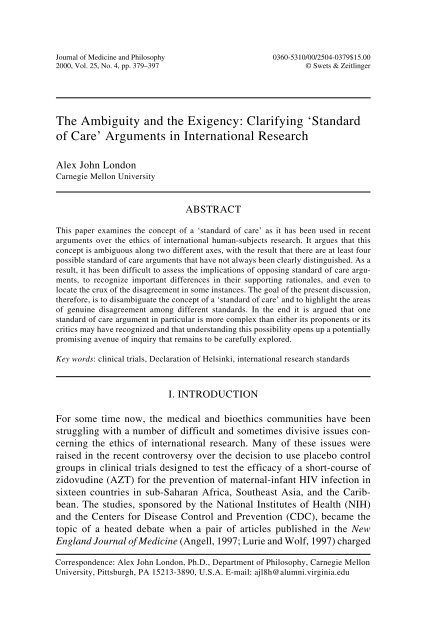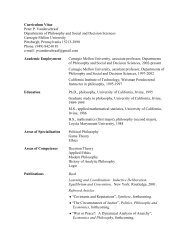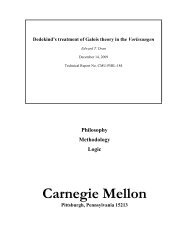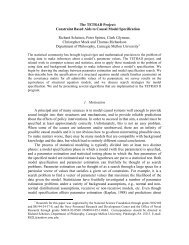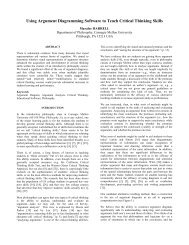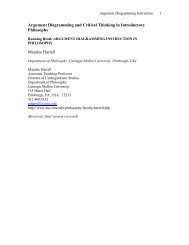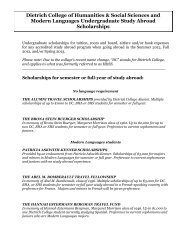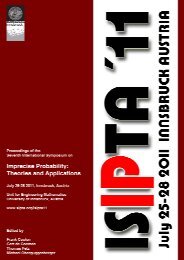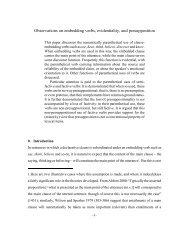The Ambiguity and the Exigency: Clarifying 'Standard of Care ...
The Ambiguity and the Exigency: Clarifying 'Standard of Care ...
The Ambiguity and the Exigency: Clarifying 'Standard of Care ...
You also want an ePaper? Increase the reach of your titles
YUMPU automatically turns print PDFs into web optimized ePapers that Google loves.
Journal <strong>of</strong> Medicine <strong>and</strong> Philosophy 0360-5310/00/2504-0379$15.00<br />
2000, Vol. 25, No. 4, pp. 379–397 © Swets & Zeitlinger<br />
<strong>The</strong> <strong>Ambiguity</strong> <strong>and</strong> <strong>the</strong> <strong>Exigency</strong>: <strong>Clarifying</strong> ‘St<strong>and</strong>ard<br />
<strong>of</strong> <strong>Care</strong>’ Arguments in International Research<br />
Alex John London<br />
Carnegie Mellon University<br />
ABSTRACT<br />
This paper examines <strong>the</strong> concept <strong>of</strong> a ‘st<strong>and</strong>ard <strong>of</strong> care’ as it has been used in recent<br />
arguments over <strong>the</strong> ethics <strong>of</strong> international human-subjects research. It argues that this<br />
concept is ambiguous along two different axes, with <strong>the</strong> result that <strong>the</strong>re are at least four<br />
possible st<strong>and</strong>ard <strong>of</strong> care arguments that have not always been clearly distinguished. As a<br />
result, it has been difficult to assess <strong>the</strong> implications <strong>of</strong> opposing st<strong>and</strong>ard <strong>of</strong> care arguments,<br />
to recognize important differences in <strong>the</strong>ir supporting rationales, <strong>and</strong> even to<br />
locate <strong>the</strong> crux <strong>of</strong> <strong>the</strong> disagreement in some instances. <strong>The</strong> goal <strong>of</strong> <strong>the</strong> present discussion,<br />
<strong>the</strong>refore, is to disambiguate <strong>the</strong> concept <strong>of</strong> a ‘st<strong>and</strong>ard <strong>of</strong> care’ <strong>and</strong> to highlight <strong>the</strong> areas<br />
<strong>of</strong> genuine disagreement among different st<strong>and</strong>ards. In <strong>the</strong> end it is argued that one<br />
st<strong>and</strong>ard <strong>of</strong> care argument in particular is more complex than ei<strong>the</strong>r its proponents or its<br />
critics may have recognized <strong>and</strong> that underst<strong>and</strong>ing this possibility opens up a potentially<br />
promising avenue <strong>of</strong> inquiry that remains to be carefully explored.<br />
Key words: clinical trials, Declaration <strong>of</strong> Helsinki, international research st<strong>and</strong>ards<br />
I. INTRODUCTION<br />
For some time now, <strong>the</strong> medical <strong>and</strong> bioethics communities have been<br />
struggling with a number <strong>of</strong> difficult <strong>and</strong> sometimes divisive issues concerning<br />
<strong>the</strong> ethics <strong>of</strong> international research. Many <strong>of</strong> <strong>the</strong>se issues were<br />
raised in <strong>the</strong> recent controversy over <strong>the</strong> decision to use placebo control<br />
groups in clinical trials designed to test <strong>the</strong> efficacy <strong>of</strong> a short-course <strong>of</strong><br />
zidovudine (AZT) for <strong>the</strong> prevention <strong>of</strong> maternal-infant HIV infection in<br />
sixteen countries in sub-Saharan Africa, Sou<strong>the</strong>ast Asia, <strong>and</strong> <strong>the</strong> Caribbean.<br />
<strong>The</strong> studies, sponsored by <strong>the</strong> National Institutes <strong>of</strong> Health (NIH)<br />
<strong>and</strong> <strong>the</strong> Centers for Disease Control <strong>and</strong> Prevention (CDC), became <strong>the</strong><br />
topic <strong>of</strong> a heated debate when a pair <strong>of</strong> articles published in <strong>the</strong> New<br />
Engl<strong>and</strong> Journal <strong>of</strong> Medicine (Angell, 1997; Lurie <strong>and</strong> Wolf, 1997) charged<br />
Correspondence: Alex John London, Ph.D., Department <strong>of</strong> Philosophy, Carnegie Mellon<br />
University, Pittsburgh, PA 15213-3890, U.S.A. E-mail: ajl8h@alumni.virginia.edu
380<br />
ALEX JOHN LONDON<br />
that <strong>the</strong> use <strong>of</strong> a placebo control group made <strong>the</strong>m unethical. Even though<br />
subsequent studies involving placebos were ei<strong>the</strong>r suspended or modified<br />
after <strong>the</strong> completion <strong>of</strong> a CDC-sponsored study in Thail<strong>and</strong>, <strong>the</strong> controversy<br />
has continued <strong>and</strong> <strong>the</strong> ethical <strong>and</strong> scientific debate has intensified. Now,<br />
however, <strong>the</strong> dispute surrounding some <strong>of</strong> <strong>the</strong>se issues could have farreaching<br />
implications for <strong>the</strong> whole <strong>of</strong> international human subjects research.<br />
Plans are underway to revise key guidelines governing <strong>the</strong> ethical<br />
conduct <strong>of</strong> international medical research, <strong>and</strong> several <strong>of</strong> <strong>the</strong> most controversial<br />
issues at <strong>the</strong> heart <strong>of</strong> <strong>the</strong> short-course AZT trials are playing a<br />
central role in <strong>the</strong> debate over some <strong>of</strong> <strong>the</strong> proposed revisions.<br />
Ra<strong>the</strong>r than attempting a wholesale appraisal <strong>of</strong> <strong>the</strong> diverse <strong>and</strong><br />
complex array <strong>of</strong> issues involved in this debate, <strong>the</strong> present paper will<br />
focus instead on one prominent, <strong>and</strong> highly controversial, issue. From <strong>the</strong><br />
outset <strong>of</strong> <strong>the</strong> controversy over <strong>the</strong> short-course AZT studies, both proponents<br />
<strong>and</strong> critics <strong>of</strong> <strong>the</strong> placebo-controlled design supported <strong>the</strong>ir positions<br />
with what I will call <strong>the</strong> ‘st<strong>and</strong>ard <strong>of</strong> care’ argument. Critics argued that<br />
<strong>the</strong> placebo driven trial design was unethical, at least in part, because it<br />
failed to provide <strong>the</strong> current st<strong>and</strong>ard <strong>of</strong> care to all members <strong>of</strong> <strong>the</strong> clinical<br />
trial. In support <strong>of</strong> <strong>the</strong>ir position <strong>the</strong>y pointed to article II.3 <strong>of</strong> <strong>the</strong> Declaration<br />
<strong>of</strong> Helsinki which states that “In any medical study, every patient –<br />
including those <strong>of</strong> a control group, if any – should be assured <strong>of</strong> <strong>the</strong> best<br />
proven diagnostic <strong>and</strong> <strong>the</strong>rapeutic method.” <strong>The</strong>y also pointed to <strong>the</strong> fact<br />
that in technologically developed countries such as France <strong>and</strong> <strong>the</strong> U.S.,<br />
<strong>the</strong> st<strong>and</strong>ard treatment used for preventing <strong>the</strong> transmission <strong>of</strong> HIV from<br />
seropositive pregnant women to <strong>the</strong>ir infant children, known as <strong>the</strong> AIDS<br />
Clinical Trials Group (ACTG) regimen 076, had been shown to cut maternal-infant<br />
HIV transmission rates by more than half (Connon et al., 1994;<br />
Sperling et al., 1996). To adopt a st<strong>and</strong>ard <strong>of</strong> care for developing nations<br />
that falls below <strong>the</strong> st<strong>and</strong>ard <strong>of</strong> care in <strong>the</strong> sponsoring countries, it was<br />
argued, was to adopt an unacceptable double st<strong>and</strong>ard in international<br />
research.<br />
Proponents <strong>of</strong> <strong>the</strong> placebo design countered by pointing out that <strong>the</strong> 076<br />
protocol was unavailable in <strong>the</strong> countries that would host <strong>the</strong> short-course<br />
trials because, at $800 per dose, it far outstripped <strong>the</strong> $10 average per-capita<br />
health budgets <strong>of</strong> <strong>the</strong> developing countries in which <strong>the</strong> trials had been<br />
proposed. As a result, <strong>the</strong>y argued, <strong>the</strong> st<strong>and</strong>ard <strong>of</strong> care that governs <strong>the</strong><br />
citizens <strong>of</strong> those countries is no treatment at all. Because <strong>the</strong>y believed that<br />
<strong>the</strong> local st<strong>and</strong>ard <strong>of</strong> care was <strong>the</strong> most relevant, <strong>the</strong>y concluded that <strong>the</strong><br />
placebo design was not unethical. Now, current proposals would amend <strong>the</strong><br />
Declaration <strong>of</strong> Helsinki so as to reflect this view. Instead <strong>of</strong> requiring that<br />
subjects receive <strong>the</strong> “best proven diagnostic <strong>and</strong> <strong>the</strong>rapeutic method,” one
THE AMBIGUITY AND THE EXIGENCY 381<br />
proposed revision would require only that subjects “not be denied access to<br />
<strong>the</strong> best proven diagnostic, prophylactic, or <strong>the</strong>rapeutic method that would<br />
o<strong>the</strong>rwise be available to him or her” (cited in Brennan, 1999, p. 529).<br />
In what follows, I will argue that this debate has been complicated by<br />
some unrecognized ambiguities in <strong>the</strong> notion <strong>of</strong> a st<strong>and</strong>ard <strong>of</strong> care. In<br />
particular, I will argue that this concept is ambiguous along two different<br />
axes, with <strong>the</strong> result that <strong>the</strong>re are at least four possible st<strong>and</strong>ard <strong>of</strong> care<br />
arguments that must be clearly distinguished. Without a clear map <strong>of</strong> <strong>the</strong><br />
normative terrain it has been difficult to assess <strong>the</strong> implications <strong>of</strong> opposing<br />
st<strong>and</strong>ard <strong>of</strong> care arguments, to recognize important differences in <strong>the</strong>ir<br />
supporting rationales, <strong>and</strong> even to locate <strong>the</strong> crux <strong>of</strong> <strong>the</strong> disagreement in<br />
some instances. <strong>The</strong> goal <strong>of</strong> this discussion, <strong>the</strong>refore, is to disambiguate<br />
<strong>the</strong> concept <strong>of</strong> a st<strong>and</strong>ard <strong>of</strong> care <strong>and</strong> to make <strong>the</strong> areas <strong>of</strong> genuine disagreement<br />
among different st<strong>and</strong>ards salient. This kind <strong>of</strong> conceptual cartography<br />
is fundamentally important for assessing <strong>the</strong> relevance <strong>and</strong> validity<br />
<strong>of</strong> <strong>the</strong> arguments in question <strong>and</strong> I will argue that it highlights important<br />
ways in which one <strong>of</strong> <strong>the</strong>se arguments in particular may be more<br />
complex than it originally appears.<br />
Because <strong>the</strong> goal <strong>of</strong> this paper is to provide a careful examination <strong>of</strong> <strong>the</strong><br />
concept <strong>of</strong> a st<strong>and</strong>ard <strong>of</strong> care <strong>and</strong> <strong>the</strong> normative arguments that it supports,<br />
it does not attempt to provide an overall evaluation <strong>of</strong> <strong>the</strong> short-course<br />
AZT studies. As a result, it also will not present an overall evaluation <strong>of</strong><br />
<strong>the</strong> importance <strong>of</strong> st<strong>and</strong>ard <strong>of</strong> care arguments relative to <strong>the</strong>se broader<br />
concerns. This is important because it may be <strong>the</strong> case that <strong>the</strong>re are o<strong>the</strong>r<br />
issues raised by <strong>the</strong>se trials that carry sufficient moral weight to trump <strong>the</strong><br />
st<strong>and</strong>ard <strong>of</strong> care argument. Before we can know whe<strong>the</strong>r this is so, however,<br />
we need to carry out <strong>the</strong> necessary conceptual <strong>and</strong> ethical analysis <strong>of</strong><br />
<strong>the</strong> st<strong>and</strong>ard <strong>of</strong> care arguments that will enable this larger conversation to<br />
proceed more carefully, <strong>and</strong> hopefully, more fruitfully as well.<br />
II. WHAT IS (ARE) THE STANDARD OF CARE ARGUMENT(S)?<br />
In order to tease out some important ambiguities in <strong>the</strong> concept <strong>of</strong> a st<strong>and</strong>ard<br />
<strong>of</strong> care, it will be helpful to look carefully at one prominent way in<br />
which <strong>the</strong> debate over <strong>the</strong> st<strong>and</strong>ard <strong>of</strong> care has been framed. Consider <strong>the</strong><br />
following claims:<br />
When Helsinki calls for <strong>the</strong> “best proven <strong>the</strong>rapeutic method” does it<br />
mean [A] <strong>the</strong> best <strong>the</strong>rapy available anywhere in <strong>the</strong> world? Or does it<br />
mean [B] <strong>the</strong> st<strong>and</strong>ard that prevails in <strong>the</strong> country in which <strong>the</strong> trial is
382<br />
ALEX JOHN LONDON<br />
conducted? Helsinki is not clear about this. But I think that [1] a careful<br />
analysis <strong>of</strong> this document <strong>and</strong> its history suggests that <strong>the</strong> best proven<br />
<strong>the</strong>rapy st<strong>and</strong>ard was intended primarily as a st<strong>and</strong>ard <strong>of</strong> medical practice.<br />
A consideration <strong>of</strong> that conclusion yields a second conclusion: that<br />
[2] <strong>the</strong> best proven <strong>the</strong>rapy st<strong>and</strong>ard must necessarily mean <strong>the</strong> st<strong>and</strong>ard<br />
that prevails in <strong>the</strong> country in which <strong>the</strong> clinical trial is carried out<br />
(Levine, R.J., 1998, p. 6; letters <strong>and</strong> numbers added).<br />
In part, interpretations A <strong>and</strong> B differ over what I will call <strong>the</strong> question <strong>of</strong><br />
<strong>the</strong> relevant reference point. Emphasizing this disagreement makes it appear<br />
as though <strong>the</strong> dispute hinges on <strong>the</strong> question <strong>of</strong> whose medical practice<br />
constitutes <strong>the</strong> relevant medical practice. Interpretation A holds that<br />
<strong>the</strong> relevant st<strong>and</strong>ard <strong>of</strong> care is <strong>the</strong> one determined by <strong>the</strong> best <strong>the</strong>rapeutic<br />
methods available anywhere in <strong>the</strong> world. Call this <strong>the</strong> global reference<br />
point. Interpretation B holds that <strong>the</strong> relevant st<strong>and</strong>ard <strong>of</strong> care is determined<br />
by <strong>the</strong> st<strong>and</strong>ard that prevails in <strong>the</strong> country in which <strong>the</strong> trial is<br />
conducted. Call this <strong>the</strong> local reference point. So understood, <strong>the</strong> sides <strong>of</strong><br />
this debate are divided into proponents <strong>of</strong> a local st<strong>and</strong>ard <strong>of</strong> care <strong>and</strong><br />
critics who champion a global st<strong>and</strong>ard <strong>of</strong> care.<br />
Framing <strong>the</strong> debate as a question <strong>of</strong> <strong>the</strong> relevant reference point, however,<br />
effectively obscures a more fundamental <strong>and</strong> largely unarticulated source<br />
<strong>of</strong> disagreement. To see this, consider a crucial assumption that lies behind<br />
<strong>the</strong> following argument. 1 It is sometimes claimed that (1)because <strong>the</strong> content<br />
<strong>of</strong> <strong>the</strong> st<strong>and</strong>ard <strong>of</strong> care is fixed by <strong>the</strong> local reference point <strong>and</strong> (2)<br />
because <strong>the</strong> prevailing treatment for preventing maternal-infant HIV transmission<br />
in <strong>the</strong> countries where <strong>the</strong> short-course AZT trials were conducted<br />
was no treatment at all, that (3) <strong>the</strong> use <strong>of</strong> a placebo does not fall below <strong>the</strong><br />
established st<strong>and</strong>ard <strong>of</strong> care. It is important to see, however, that in order<br />
for (3) to follow from (1) <strong>and</strong> (2), we have to do more than simply adopt<br />
<strong>the</strong> local reference point for <strong>the</strong> st<strong>and</strong>ard <strong>of</strong> care. For <strong>the</strong> argument to be<br />
valid it must also employ what I will call a de facto interpretation <strong>of</strong> <strong>the</strong><br />
concept <strong>of</strong> <strong>the</strong> st<strong>and</strong>ard <strong>of</strong> care. Let me explain.<br />
Let’s grant <strong>the</strong> claim that <strong>the</strong> st<strong>and</strong>ard <strong>of</strong> care is intended to be a st<strong>and</strong>ard<br />
<strong>of</strong> medical practice. <strong>The</strong> above argument tacitly assumes a de facto<br />
interpretation <strong>of</strong> <strong>the</strong> st<strong>and</strong>ard <strong>of</strong> care according to which <strong>the</strong> st<strong>and</strong>ards <strong>of</strong><br />
medical practice for a community are set by <strong>the</strong> actual medical practices <strong>of</strong><br />
that community. It is only under this interpretation that <strong>the</strong> use <strong>of</strong> a placebo<br />
does not fall below <strong>the</strong> st<strong>and</strong>ard <strong>of</strong> care in countries where <strong>the</strong>re is no<br />
effective treatment for maternal-infant transmission <strong>of</strong> HIV. For <strong>the</strong> sake<br />
<strong>of</strong> clarity, <strong>the</strong> argument from <strong>the</strong> local de facto interpretation <strong>of</strong> <strong>the</strong> st<strong>and</strong>ard<br />
<strong>of</strong> care can be stated as follows:
THE AMBIGUITY AND THE EXIGENCY 383<br />
(A) 1. It is unethical to conduct a clinical trial in which some subjects<br />
receive a level <strong>of</strong> care that falls below <strong>the</strong> established st<strong>and</strong>ard <strong>of</strong><br />
care.<br />
2. <strong>The</strong> established st<strong>and</strong>ard <strong>of</strong> care is to be determined by <strong>the</strong> local<br />
de facto practices <strong>of</strong> <strong>the</strong> host community.<br />
3. In <strong>the</strong> countries where <strong>the</strong> short-course AZT trials were conducted<br />
<strong>the</strong> local de facto clinical practice for preventing maternal-infant<br />
HIV transmission was no treatment at all.<br />
4. <strong>The</strong> use <strong>of</strong> a placebo control group in <strong>the</strong>se countries does not fall<br />
below <strong>the</strong> established st<strong>and</strong>ard <strong>of</strong> care.<br />
5. <strong>The</strong>refore, <strong>the</strong> use <strong>of</strong> a placebo control group is not unethical on<br />
<strong>the</strong> ground that it fails to provide <strong>the</strong> established st<strong>and</strong>ard <strong>of</strong> care.<br />
If we assume that <strong>the</strong> crux <strong>of</strong> <strong>the</strong> debate hinges on <strong>the</strong> question <strong>of</strong> <strong>the</strong><br />
relevant reference point <strong>the</strong>n we must also assume that critics <strong>of</strong> this<br />
argument accept <strong>the</strong> de facto interpretation but opt instead for a more<br />
global reference point. So understood, <strong>the</strong>y would be making a global de<br />
facto argument: 2<br />
(B) 1. It is unethical to conduct a clinical trial in which some subjects<br />
receive a level <strong>of</strong> care that falls below <strong>the</strong> established st<strong>and</strong>ard <strong>of</strong><br />
care.<br />
2. <strong>The</strong> established st<strong>and</strong>ard <strong>of</strong> care is to be determined by <strong>the</strong> broader<br />
de facto practices <strong>of</strong> <strong>the</strong> sponsoring nations.<br />
3. <strong>The</strong> de facto clinical practice for preventing maternal-infant HIV<br />
transmission in <strong>the</strong> countries <strong>of</strong> <strong>the</strong> developed world sponsoring<br />
<strong>the</strong> short-course AZT trials is <strong>the</strong> 076 protocol.<br />
4. <strong>The</strong> use <strong>of</strong> a placebo control group in <strong>the</strong> countries where shortcourse<br />
AZT trials were proposed falls below <strong>the</strong> established st<strong>and</strong>ard<br />
in <strong>the</strong> developed world.<br />
5. <strong>The</strong>refore, <strong>the</strong> use <strong>of</strong> a placebo control group is unethical on <strong>the</strong><br />
ground that it fails to provide <strong>the</strong> established st<strong>and</strong>ard <strong>of</strong> care.<br />
This may represent a common way <strong>of</strong> framing <strong>the</strong> debate over <strong>the</strong> st<strong>and</strong>ard<br />
<strong>of</strong> care, but it obscures <strong>the</strong> fact that <strong>the</strong> de facto interpretation <strong>of</strong> <strong>the</strong><br />
st<strong>and</strong>ard is itself highly contentious. As a result, it fails to capture a more<br />
fundamental area <strong>of</strong> disagreement. If we return to <strong>the</strong> language <strong>of</strong> <strong>the</strong><br />
Declaration <strong>of</strong> Helsinki, for example, we see that it speaks <strong>of</strong> providing<br />
<strong>the</strong> best proven diagnostic <strong>and</strong> <strong>the</strong>rapeutic interventions. This seems to<br />
indicate that <strong>the</strong> idea <strong>of</strong> a st<strong>and</strong>ard <strong>of</strong> care is what I will call a de jure<br />
st<strong>and</strong>ard in that it is set, not by what physicians in some locality actually
384<br />
ALEX JOHN LONDON<br />
do, but by <strong>the</strong> judgment <strong>of</strong> experts in <strong>the</strong> medical community as to which<br />
diagnostic <strong>and</strong> <strong>the</strong>rapeutic practices have proven most effective against<br />
<strong>the</strong> illness in question. This is <strong>the</strong> interpretation embraced by Marcia Angell<br />
when she argues that <strong>the</strong> investigators conducting a trial “would be<br />
guilty <strong>of</strong> knowingly giving inferior treatment to some participants <strong>of</strong> <strong>the</strong><br />
trial,” unless subjects in <strong>the</strong> control group “receive <strong>the</strong> best known treatment”<br />
(Angell, 1997, p. 847). For critics like Angell, <strong>the</strong> question <strong>of</strong> <strong>the</strong><br />
relevant reference point is irrelevant because adopting <strong>the</strong> de jure interpretation<br />
<strong>of</strong> <strong>the</strong> st<strong>and</strong>ard <strong>of</strong> care allows <strong>the</strong>m to argue that a placebo control is<br />
unjustified even relative to <strong>the</strong> local point <strong>of</strong> reference. To see how this<br />
might be so, consider <strong>the</strong> argument from <strong>the</strong> local de jure st<strong>and</strong>ard <strong>of</strong> care:<br />
(C) 1. It is unethical to conduct a clinical trial in which some subjects<br />
receive a level <strong>of</strong> care that falls below <strong>the</strong> established st<strong>and</strong>ard <strong>of</strong><br />
care.<br />
2. <strong>The</strong> established st<strong>and</strong>ard <strong>of</strong> care is to be determined by <strong>the</strong> judgment<br />
<strong>of</strong> medical experts in <strong>the</strong> host community as to which diagnostic<br />
<strong>and</strong> <strong>the</strong>rapeutic interventions have been proven most effective.<br />
3. Medical experts in <strong>the</strong> relevant host communities know <strong>the</strong> 076<br />
protocol has been shown to cut <strong>the</strong> maternal-infant HIV transmission<br />
rate by more than half in developed nations such as <strong>the</strong> United<br />
States.<br />
4. <strong>The</strong> use <strong>of</strong> a placebo control group in <strong>the</strong> developing countries<br />
where <strong>the</strong> short-course AZT trials were proposed falls below <strong>the</strong><br />
established st<strong>and</strong>ard in those very countries.<br />
5. <strong>The</strong>refore, <strong>the</strong> use <strong>of</strong> a placebo control group is unethical on <strong>the</strong><br />
ground that it fails to provide <strong>the</strong> established st<strong>and</strong>ard <strong>of</strong> care.<br />
A global version <strong>of</strong> this argument can be constructed by substituting <strong>the</strong><br />
following for premise C2: 3<br />
(D) 2. <strong>The</strong> established st<strong>and</strong>ard <strong>of</strong> care is to be determined by <strong>the</strong> judgment<br />
<strong>of</strong> medical experts in some larger medical community as to<br />
which diagnostic <strong>and</strong> <strong>the</strong>rapeutic interventions have been proven<br />
most effective.<br />
Below, I will suggest that this argument is more complex than even its<br />
proponents may realize <strong>and</strong> that its implications have yet to be clearly<br />
explored. For <strong>the</strong> moment, however, I simply want to note that <strong>the</strong> choice<br />
<strong>of</strong> reference points does not affect <strong>the</strong> conclusion <strong>of</strong> <strong>the</strong> argument. As a<br />
result, it looks like <strong>the</strong> real crux <strong>of</strong> <strong>the</strong> dispute may hinge, not on <strong>the</strong>
THE AMBIGUITY AND THE EXIGENCY 385<br />
question <strong>of</strong> <strong>the</strong> relevant reference point, but on <strong>the</strong> way we interpret <strong>the</strong><br />
st<strong>and</strong>ard <strong>of</strong> medical practice that is embodied in <strong>the</strong> st<strong>and</strong>ard <strong>of</strong> care: is it<br />
a de facto or a de jure st<strong>and</strong>ard?<br />
When <strong>the</strong> crux <strong>of</strong> <strong>the</strong> argument is understood this way, it becomes<br />
absolutely essential not to confuse <strong>the</strong> argument from <strong>the</strong> global de facto<br />
st<strong>and</strong>ard (B) with <strong>the</strong> argument from <strong>the</strong> local de jure st<strong>and</strong>ard (C). In part,<br />
this is because arguments (B) <strong>and</strong> (C) <strong>the</strong>mselves differ over <strong>the</strong> question<br />
<strong>of</strong> <strong>the</strong> relevant reference point. As a result, objections that tell against <strong>the</strong><br />
use <strong>of</strong> a global reference point may carry weight against argument (B) <strong>and</strong><br />
not militate against – <strong>and</strong> may even support – argument (C). Fur<strong>the</strong>rmore,<br />
given that <strong>the</strong>se arguments embody different conceptions <strong>of</strong> <strong>the</strong> st<strong>and</strong>ard<br />
<strong>of</strong> care, each <strong>of</strong> which has a substantially different supporting rationale,<br />
we must not assume that <strong>the</strong>y will have <strong>the</strong> same implications for <strong>the</strong><br />
conduct <strong>of</strong> international research. In <strong>the</strong> following section I will suggest<br />
that a failure to differentiate arguments (B) <strong>and</strong> (C) may have led to <strong>the</strong><br />
acceptance <strong>of</strong> a false dilemma: ei<strong>the</strong>r we accept <strong>the</strong> local de facto st<strong>and</strong>ard<br />
<strong>of</strong> care or we accept a higher st<strong>and</strong>ard that rules out altoge<strong>the</strong>r <strong>the</strong> international<br />
research that could be most important for populations <strong>of</strong> <strong>the</strong> developing<br />
world. 4 In order to appreciate this, however, <strong>and</strong> to evaluate <strong>the</strong><br />
merits <strong>of</strong> <strong>the</strong> local de facto <strong>and</strong> local de jure arguments, it will be necessary<br />
to look more carefully at <strong>the</strong> differences between <strong>the</strong> de facto <strong>and</strong> de<br />
jure interpretations <strong>of</strong> <strong>the</strong> st<strong>and</strong>ard <strong>of</strong> care.<br />
III. THE LOCAL DE FACTO STANDARD OF CARE<br />
One fairly simple reason that we might be inclined to accept <strong>the</strong> local de facto<br />
st<strong>and</strong>ard <strong>of</strong> care is that it appears to be more reasonable than <strong>the</strong> global de<br />
facto st<strong>and</strong>ard. Consider, for instance, some <strong>of</strong> <strong>the</strong> problems with <strong>the</strong> latter<br />
argument (B). On its face it appears to place arbitrary restrictions on important<br />
international research. Critics can easily question why <strong>the</strong> practices <strong>of</strong><br />
some wealthy, technologically developed groups with sophisticated <strong>and</strong><br />
well-entrenched healthcare infrastructures should also govern people who<br />
live under conditions <strong>of</strong> extreme fiscal scarcity, without a robust healthcare<br />
infrastructure, under different cultural <strong>and</strong> social conditions. Isn’t this arbitrary?<br />
Might it not be ethical, ra<strong>the</strong>r than social or cultural, imperialism?<br />
In contrast, proponents <strong>of</strong> <strong>the</strong> narrow de facto argument (A) argue that it<br />
will foster <strong>the</strong> research that will ultimately lead to <strong>the</strong> kinds <strong>of</strong> interventions<br />
that will best address <strong>the</strong> healthcare concerns <strong>of</strong> developing populations.<br />
<strong>The</strong> local status quo frames <strong>the</strong> appropriate clinical question <strong>and</strong><br />
enables us to design a study that will demonstrate <strong>the</strong> effectiveness <strong>of</strong> an
386<br />
ALEX JOHN LONDON<br />
intervention when compared to <strong>the</strong> current treatment situation (in <strong>the</strong> case<br />
<strong>of</strong> <strong>the</strong> short-course trials, nothing) (Levine, R. J., 1998, p. 7). This difference<br />
in <strong>the</strong> treatment situation is what makes it permissible to conduct a<br />
placebo-controlled trial in a developing country when it could not be conducted<br />
ethically in <strong>the</strong> U.S. Fur<strong>the</strong>rmore, it is argued, <strong>the</strong> use <strong>of</strong> a placebo<br />
does not deny subjects <strong>of</strong> developing countries care that <strong>the</strong>y would o<strong>the</strong>rwise<br />
receive, since <strong>the</strong>y aren’t currently receiving any beneficial care, <strong>and</strong><br />
it does not inflict new or additional health burdens on research subjects<br />
(Grady, 1998, p. 36; Salim <strong>and</strong> Abdool, 1998, p. 565; Francis, 1998, p.<br />
837; see also Levine, C., 1998, p. 46). In fact, it is likely that in many cases<br />
research subjects would receive a net benefit from participating in this<br />
kind <strong>of</strong> research since <strong>the</strong>y would probably receive routine health care,<br />
o<strong>the</strong>rwise unavailable, as a part <strong>of</strong> <strong>the</strong> clinical trial. 5<br />
When <strong>the</strong> alternative is <strong>the</strong> global de facto argument (B), we may be<br />
inclined to support <strong>the</strong> local de facto argument (A) simply out <strong>of</strong> <strong>the</strong> desire<br />
to help developing countries conduct <strong>the</strong> research that will answer <strong>the</strong><br />
healthcare questions that best address <strong>the</strong>ir substantial <strong>and</strong> urgent healthcare<br />
needs. This way <strong>of</strong> thinking, however, may also keep us from recognizing<br />
<strong>the</strong> substantial shortcomings <strong>of</strong> <strong>the</strong> local de facto st<strong>and</strong>ard <strong>of</strong> care.<br />
For many, <strong>the</strong> most appealing aspect <strong>of</strong> this st<strong>and</strong>ard <strong>of</strong> care is <strong>the</strong> fact that<br />
it allows us to design clinical trials that will answer <strong>the</strong> right experimental<br />
questions. In <strong>the</strong> case <strong>of</strong> <strong>the</strong> short-course AZT trials, for instance, <strong>the</strong><br />
relevant question was not how a short-course <strong>of</strong> AZT compared to <strong>the</strong> 076<br />
regimen but how much better it would be than nothing. Unfortunately,<br />
however, it is precisely because <strong>the</strong> status quo is what sets research into<br />
motion that it cannot also function as an independent test <strong>of</strong> <strong>the</strong> moral<br />
acceptability <strong>of</strong> a clinical trial. Let me be clear about what this means. <strong>The</strong><br />
research questions that are relevant to a particular community are, to a<br />
large degree, a function <strong>of</strong> <strong>the</strong> needs <strong>of</strong> <strong>the</strong> people in that community<br />
relative to <strong>the</strong> level <strong>of</strong> healthcare <strong>the</strong>y actually receive. It is also true that<br />
acceptable clinical trials should produce results that will be relevant to a<br />
community’s healthcare needs. But it doesn’t follow from this that all<br />
research that would be relevant to a community’s healthcare needs is<br />
morally acceptable research. Relevance, elegance, efficiency, <strong>the</strong>se are all<br />
virtues that morally acceptable trials should possess. But not all relevant,<br />
elegant, <strong>and</strong> efficient trials are morally acceptable. 6<br />
It is important to recognize, <strong>the</strong>refore, that <strong>the</strong> local de facto st<strong>and</strong>ard <strong>of</strong><br />
care does not receive independent support from <strong>the</strong> claim that subjects<br />
who would not receive medical care outside <strong>of</strong> a clinical trial are not<br />
denied care when <strong>the</strong>y are given a placebo. Ra<strong>the</strong>r than providing independent<br />
support for <strong>the</strong> de facto st<strong>and</strong>ard <strong>of</strong> care, this is simply an alterna-
THE AMBIGUITY AND THE EXIGENCY 387<br />
tive formulation <strong>of</strong> <strong>the</strong> very st<strong>and</strong>ard in question. As a result, <strong>the</strong> truth <strong>of</strong><br />
this claim itself presupposes <strong>the</strong> truth <strong>of</strong> <strong>the</strong> argument from <strong>the</strong> local de<br />
facto st<strong>and</strong>ard <strong>of</strong> care. Those who reject <strong>the</strong> latter argument would rightly<br />
reject this claim on <strong>the</strong> grounds that it simply assumes <strong>the</strong> conclusion that<br />
is in dispute. This means that proponents <strong>of</strong> a different st<strong>and</strong>ard <strong>of</strong> care<br />
could make an equally valid claim that subjects <strong>of</strong> medical research are<br />
being denied medical care to which <strong>the</strong>y are entitled if, for example, <strong>the</strong>y<br />
do not receive <strong>the</strong> same level <strong>of</strong> care that <strong>the</strong> researchers or <strong>the</strong>ir sponsoring<br />
agencies normally provide to people with <strong>the</strong>ir condition. I will return<br />
to this point in a moment.<br />
For now, consider some <strong>of</strong> problems that argument (A) faces in its own<br />
right. For example, <strong>the</strong> scope <strong>of</strong> this argument is more comprehensive than<br />
its proponents may be willing to accept. In particular, we want to know<br />
whe<strong>the</strong>r <strong>the</strong>re are non-arbitrary reasons for keeping this argument, <strong>and</strong> its<br />
supporting rationale, from applying to sub-groups within established political<br />
borders (see Kim, 1998, p. 838 <strong>and</strong> Angell, 1998, p. 843). After all,<br />
if <strong>the</strong> st<strong>and</strong>ard <strong>of</strong> care is set by a community’s de facto medical practices,<br />
<strong>and</strong> if <strong>the</strong> actual practices <strong>of</strong> doctors differ within ethnic, cultural, or<br />
economic subgroups, shouldn’t those subgroups be governed by different<br />
st<strong>and</strong>ards <strong>of</strong> care in research? This is a powerful <strong>and</strong> potentially damning<br />
objection, because most proponents <strong>of</strong> <strong>the</strong> placebo design appear to believe<br />
that it would be genuinely unethical to conduct short-course AZT<br />
trials with a placebo control in <strong>the</strong> U.S. If this objection cannot be met, it<br />
would mean that <strong>the</strong> members <strong>of</strong> marginalized or oppressed subgroups,<br />
even within a developed nation like <strong>the</strong> U.S., would be governed by a<br />
lower st<strong>and</strong>ard <strong>of</strong> care in medical research than <strong>the</strong>ir wealthier counterparts<br />
precisely because <strong>the</strong>y have been socially <strong>and</strong> economically marginalized<br />
or oppressed. This, however, is anti<strong>the</strong>tical to <strong>the</strong> very idea <strong>of</strong><br />
ethically sound human subjects research. As a result, anyone who is inclined<br />
to accept this argument takes on <strong>the</strong> increased burden <strong>of</strong> providing<br />
non-arbitrary reasons for limiting its scope <strong>of</strong> applicability.<br />
This is also a powerful objection because it highlights <strong>the</strong> degree to<br />
which <strong>the</strong> narrow de facto st<strong>and</strong>ard <strong>of</strong> care appears to be out <strong>of</strong> step with<br />
<strong>the</strong> rationale for protecting human subjects in research within <strong>the</strong> U.S.<br />
This way <strong>of</strong> formulating <strong>the</strong> st<strong>and</strong>ard <strong>of</strong> care trades on <strong>the</strong> assumption that<br />
<strong>the</strong> level <strong>of</strong> care research subjects receive should be determined by factors<br />
that are extrinsic to <strong>the</strong> researcher/subject relationship. Ano<strong>the</strong>r way <strong>of</strong><br />
putting this is to say that, on this view, <strong>the</strong> terms <strong>of</strong> <strong>the</strong> researcher/subject<br />
relationship are to be determined by circumstances that are largely independent<br />
<strong>of</strong> <strong>the</strong> existence <strong>of</strong> that relationship. In order to know what st<strong>and</strong>ard<br />
<strong>of</strong> care subjects are entitled to, researchers, on this view, have to look
388<br />
ALEX JOHN LONDON<br />
at <strong>the</strong> circumstances in which those subjects live. In order to know whe<strong>the</strong>r<br />
subjects in Tanzania should be subject to <strong>the</strong> same st<strong>and</strong>ards <strong>of</strong> care as<br />
subjects in Tucson, we have to look at <strong>the</strong> socio-economic circumstances<br />
in which <strong>the</strong>y live. Traditionally, however, <strong>the</strong> debate about <strong>the</strong> protections<br />
that human research subjects should receive has been formulated<br />
largely in terms <strong>of</strong> problems that are inherent to <strong>the</strong> nature <strong>of</strong> medical<br />
research <strong>and</strong> <strong>the</strong> researcher/subject relationship. Socio-economic factors<br />
were important but largely because <strong>the</strong>y marked out vulnerable populations<br />
where an increased sensitivity to issues <strong>of</strong> exploitation <strong>and</strong> competence<br />
was warranted. As such, Lurie <strong>and</strong> Wolfe (1997) were right to argue<br />
that this interpretation <strong>of</strong> <strong>the</strong> st<strong>and</strong>ard <strong>of</strong> care marks a change in <strong>the</strong> way<br />
research protections are conceived – a double st<strong>and</strong>ard for medical research.<br />
Not only is this a different st<strong>and</strong>ard, it is a dangerous st<strong>and</strong>ard because it<br />
fails to take account <strong>of</strong> <strong>the</strong> context in which a community’s de facto<br />
medical practices originate. By simply elevating <strong>the</strong> status quo to <strong>the</strong> level<br />
<strong>of</strong> a normative st<strong>and</strong>ard it does not distinguish between situations <strong>of</strong> scarcity<br />
that are <strong>the</strong> result <strong>of</strong> exploitation, force or fraud <strong>and</strong> those that are not.<br />
This leaves it open to exploitation <strong>and</strong> <strong>the</strong> danger <strong>of</strong> being manipulated in<br />
unscrupulous ways, on <strong>the</strong> international level by <strong>the</strong> economic or military<br />
interference <strong>of</strong> an outside group on <strong>the</strong> availability <strong>of</strong> medicines, medical<br />
personnel, or medical training within a particular nation, <strong>and</strong> on an intranational<br />
level by <strong>the</strong>se same activities on <strong>the</strong> part <strong>of</strong> dominant power<br />
groups. 7<br />
<strong>The</strong> fact that argument (A) unreflectively embraces <strong>the</strong> status quo may<br />
sometimes be overlooked because <strong>of</strong> an ambiguity in <strong>the</strong> notion <strong>of</strong> a ‘practice’.<br />
As it has come to be used by some (communitarians, for example), a<br />
practice is a norm-governed activity in which people engage, in part at<br />
least, for <strong>the</strong> sake <strong>of</strong> goods that are internal to <strong>the</strong> practice. On this view, a<br />
practice is an activity through which people pursue certain goods <strong>and</strong><br />
underst<strong>and</strong> <strong>the</strong>mselves, <strong>the</strong>ir community, <strong>and</strong> perhaps <strong>the</strong>ir larger world.<br />
Because practices <strong>of</strong> this kind can play an integral part in <strong>the</strong> identity <strong>of</strong><br />
individuals or communities, <strong>the</strong>y may deserve special protections or carry<br />
special normative weight. However, <strong>the</strong> de facto ‘practice’ <strong>of</strong> physicians<br />
in Thail<strong>and</strong>, for example, is not such a practice. 8 Thai physicians underst<strong>and</strong><br />
that <strong>the</strong>y are unable to effectively prevent maternal-infant transmission<br />
<strong>of</strong> HIV <strong>and</strong> are <strong>the</strong>mselves calling for <strong>the</strong> international help required<br />
to change this. As Lurie <strong>and</strong> Wolfe rightly point out, “In developing countries,<br />
<strong>the</strong> st<strong>and</strong>ard <strong>of</strong> care … is not based on a consideration <strong>of</strong> alternative<br />
treatments or previous clinical data, but is instead an economically determined<br />
policy <strong>of</strong> governments that cannot afford <strong>the</strong> prices set by drug
THE AMBIGUITY AND THE EXIGENCY 389<br />
companies” (1997, p. 855). So we must be careful not to confuse this kind<br />
<strong>of</strong> de facto practice with <strong>the</strong> more normatively weighty sense <strong>of</strong> “practice”<br />
favored by communitarians.<br />
IV. THE LOCAL DE JURE STANDARD OF CARE<br />
When <strong>the</strong> crux <strong>of</strong> <strong>the</strong> debate over <strong>the</strong> st<strong>and</strong>ard <strong>of</strong> care is framed, not as a<br />
question <strong>of</strong> <strong>the</strong> relevant reference point, but as hinging on <strong>the</strong> choice<br />
between <strong>the</strong> local de facto <strong>and</strong> local de jure interpretations, many <strong>of</strong> <strong>the</strong>se<br />
problems with argument (A) become salient. For <strong>the</strong> proponents <strong>of</strong> a de<br />
jure st<strong>and</strong>ard, <strong>the</strong> local de facto st<strong>and</strong>ard is formulated in response to <strong>the</strong><br />
wrong question. <strong>The</strong> latter st<strong>and</strong>ard answers <strong>the</strong> question <strong>of</strong> what research<br />
subjects may be entitled to outside <strong>of</strong> <strong>the</strong> research context, what <strong>the</strong>y<br />
would be entitled to if research were not taking place (with <strong>the</strong> dubious<br />
assumption that <strong>the</strong>ir current situation is unfortunate <strong>and</strong> not unjust). But<br />
this is not what is at issue. What is at issue is what subjects are entitled to<br />
within <strong>the</strong> context <strong>of</strong> research itself, given <strong>the</strong> nature <strong>of</strong> scientific research<br />
<strong>and</strong> <strong>the</strong> fact that <strong>the</strong> researchers studying <strong>the</strong>m have <strong>the</strong> knowledge <strong>and</strong><br />
training – <strong>and</strong> <strong>of</strong>ten work for governments or institutions with <strong>the</strong> resources<br />
– to prevent some <strong>of</strong> <strong>the</strong> harms <strong>the</strong>y encounter as a result <strong>of</strong> <strong>the</strong>ir vast,<br />
unmet healthcare needs. It may be true that <strong>the</strong> use <strong>of</strong> analogies with past<br />
research sc<strong>and</strong>als has not generally helped to advance <strong>the</strong> present debate,<br />
but critics <strong>of</strong> this position are right to point out that this idea – that research<br />
subjects are only entitled to what <strong>the</strong>y would o<strong>the</strong>rwise receive<br />
outside <strong>of</strong> <strong>the</strong> research context <strong>and</strong> that researchers are under no independent<br />
obligation to prevent outcomes that would occur outside <strong>of</strong> <strong>the</strong> research<br />
context anyway – was also used to support <strong>the</strong> studies at Tuskeege<br />
<strong>and</strong> Willowbrook. 9 It may also be true that <strong>the</strong> proposed short-course trials<br />
were crucially different from <strong>the</strong>se sc<strong>and</strong>alous studies. But this point only<br />
highlights <strong>the</strong> need for those who defend <strong>the</strong> former studies to reject a<br />
moral justification that would also license <strong>the</strong> latter. After all, <strong>the</strong> claim<br />
that roughly <strong>the</strong> same states <strong>of</strong> affairs would likely have obtained even if<br />
no research had been conducted does not obviate <strong>the</strong> fact that, in <strong>the</strong> actual<br />
case, <strong>the</strong> state <strong>of</strong> affairs that actually obtains is at least partially a product<br />
<strong>of</strong> <strong>the</strong> explicit choices <strong>and</strong> activities <strong>of</strong> specific individuals <strong>and</strong> agencies.<br />
For this reason, <strong>the</strong> de jure st<strong>and</strong>ard is founded upon <strong>the</strong> researchers’<br />
obligation to ensure that subjects <strong>of</strong> clinical trials are not knowingly exposed<br />
to foreseeable <strong>and</strong> preventable harms. Clinical trials are not <strong>the</strong><br />
products <strong>of</strong> natural events or inevitable processes; <strong>the</strong>y are <strong>the</strong> result <strong>of</strong><br />
deliberation <strong>and</strong> choice on <strong>the</strong> part <strong>of</strong> actual individuals <strong>and</strong> agencies. <strong>The</strong>
390<br />
ALEX JOHN LONDON<br />
de jure requirement that researchers provide <strong>the</strong> treatment that has been<br />
shown to be most effective against <strong>the</strong> relevant illness is itself a corollary<br />
<strong>of</strong> <strong>the</strong> requirement that equipoise exist in order for a clinical trial to be<br />
morally permissible.<br />
Clinical equipoise exists when <strong>the</strong>re is genuine uncertainty among experts<br />
as to whe<strong>the</strong>r a proposed intervention is as good as or better than <strong>the</strong><br />
current, known beneficial treatment for <strong>the</strong> illness at issue (Freedman,<br />
1987 <strong>and</strong> 1990). A trial <strong>of</strong> a short course <strong>of</strong> AZT that used a placebo<br />
control group within <strong>the</strong> United States would be unethical because <strong>the</strong> 076<br />
protocol has been shown to cut maternal-infant HIV transmission rates by<br />
more than half. In order for clinical equipoise to exist, <strong>the</strong> short course<br />
would have to be tried against <strong>the</strong> 076 regimen <strong>and</strong> <strong>the</strong>re would have to be<br />
reason to believe that <strong>the</strong> short-course <strong>of</strong> AZT might be equally or more<br />
effective than its established counterpart.<br />
By linking <strong>the</strong> st<strong>and</strong>ard <strong>of</strong> care to <strong>the</strong> knowledge <strong>and</strong> abilities <strong>of</strong> researchers,<br />
argument (C) highlights <strong>the</strong> fact that medical research is a human<br />
activity, <strong>the</strong> terms <strong>of</strong> which are fundamentally shaped by human<br />
agency <strong>and</strong> choice. <strong>The</strong> fundamental goal <strong>of</strong> medical research is not to<br />
provide health care but to ga<strong>the</strong>r medical knowledge which, it is hoped,<br />
will result in <strong>the</strong> development or perfection <strong>of</strong> interventions that will benefit<br />
future patients. Because <strong>the</strong> design <strong>of</strong> a trial is <strong>the</strong> result <strong>of</strong> <strong>the</strong> exercise<br />
<strong>of</strong> such agency <strong>and</strong> choice, <strong>the</strong> researchers <strong>and</strong> agencies that sponsor clinical<br />
trials are responsible for <strong>the</strong> ramifications that trial designs have on<br />
<strong>the</strong> welfare <strong>of</strong> <strong>the</strong> people who submit <strong>the</strong>mselves to scientific study. <strong>The</strong><br />
requirement that clinical equipoise obtain is essential to <strong>the</strong> conduct <strong>of</strong><br />
acceptable medical research because it ensures that researchers do not<br />
undertake trials in which <strong>the</strong> welfare <strong>of</strong> some individuals is knowingly<br />
sacrificed in exchange for knowledge, <strong>and</strong> ultimately, <strong>the</strong> welfare <strong>of</strong> future<br />
patients. By providing <strong>the</strong> de jure st<strong>and</strong>ard <strong>of</strong> care, researchers <strong>and</strong><br />
<strong>the</strong>ir sponsoring agencies ensure that <strong>the</strong> subjects <strong>of</strong> clinical research are<br />
not exploited, even for what we can all agree is a noble end.<br />
Now that <strong>the</strong> rationale for <strong>the</strong> de jure st<strong>and</strong>ard is clear, it remains to<br />
elucidate <strong>the</strong> implications <strong>of</strong> this st<strong>and</strong>ard for international medical research.<br />
I suggested above that, to some degree, support for <strong>the</strong> local de<br />
facto interpretation may be rooted in <strong>the</strong> perception that a higher st<strong>and</strong>ard<br />
<strong>of</strong> care would place unduly stringent restrictions on <strong>the</strong> use <strong>of</strong> placebos in<br />
international research. Although this may be true for <strong>the</strong> global de facto<br />
st<strong>and</strong>ard, is it true for <strong>the</strong> local de jure st<strong>and</strong>ard as well?
THE AMBIGUITY AND THE EXIGENCY 391<br />
V. THE COMPLEXITY OF THE DE JURE FRAMEWORK<br />
I want to suggest that <strong>the</strong> local de jure st<strong>and</strong>ard <strong>of</strong> care does not yield as<br />
unequivocal a restriction on <strong>the</strong> use <strong>of</strong> placebo controls as one might think<br />
<strong>and</strong> that answering this question will be more complicated than it may first<br />
appear. In particular, because this st<strong>and</strong>ard is built around <strong>the</strong> concept <strong>of</strong><br />
clinical equipoise, <strong>the</strong> severity <strong>of</strong> <strong>the</strong> restriction that it does yield will<br />
depend in large part on <strong>the</strong> nature <strong>of</strong> <strong>the</strong> conception <strong>of</strong> clinical equipoise<br />
that we embrace. This is an important claim, because it points to a way in<br />
which we might formulate <strong>the</strong> debate over <strong>the</strong> moral legitimacy <strong>of</strong> <strong>the</strong> use<br />
<strong>of</strong> placebo controls in international research from within <strong>the</strong> framework <strong>of</strong><br />
<strong>the</strong> local de jure st<strong>and</strong>ard <strong>of</strong> care itself. In order to see how this is so, <strong>and</strong><br />
why it might be desirable, let me explain how some placebo controls might<br />
be justified according to <strong>the</strong> local de jure st<strong>and</strong>ard <strong>of</strong> care.<br />
In her original article in <strong>the</strong> New Engl<strong>and</strong> Journal <strong>of</strong> Medicine, Marcia<br />
Angell argued for what I am calling a de jure st<strong>and</strong>ard <strong>of</strong> care. However, it<br />
is not clear how sweeping a restriction she takes this st<strong>and</strong>ard to yield. At<br />
one point, for instance, she says that “only when <strong>the</strong>re is no known effective<br />
treatment is it ethical to compare a potential new treatment with a<br />
placebo” (1997, p. 847). This has encouraged some to frame <strong>the</strong> debate as<br />
a question <strong>of</strong> what I call <strong>the</strong> local de facto st<strong>and</strong>ard versus <strong>the</strong> best <strong>the</strong>rapy<br />
available anywhere in <strong>the</strong> world (e.g., Levine, R.J., 1998, p. 6). But<br />
Angell’s claim can be interpreted in two different ways:<br />
I1. Only when <strong>the</strong>re is no known effective treatment for illness x anywhere<br />
in <strong>the</strong> world is it ethical to compare a potential new treatment<br />
with a placebo.<br />
I2. Only when <strong>the</strong>re is no known effective treatment anywhere in <strong>the</strong><br />
world for illness x within a population p is it ethical to compare a<br />
potential new treatment with a placebo in population p.<br />
Although <strong>the</strong> local de facto st<strong>and</strong>ard is <strong>of</strong>ten contrasted with interpretation<br />
I1 – <strong>the</strong> more restrictive st<strong>and</strong>ard – this interpretation is itself out <strong>of</strong> step<br />
with <strong>the</strong> rationale <strong>of</strong> <strong>the</strong> de jure conception <strong>of</strong> <strong>the</strong> st<strong>and</strong>ard <strong>of</strong> care. <strong>The</strong><br />
reason is simply that such substantial differences between treatment populations<br />
can exist as to warrant genuine <strong>and</strong> credible doubts in <strong>the</strong> medical<br />
community about whe<strong>the</strong>r a treatment that is effective in one population<br />
will be effective in ano<strong>the</strong>r. As a result, interpretation I2 most accurately<br />
reflects <strong>the</strong> de jure st<strong>and</strong>ard <strong>of</strong> care. It yields a more reasonable <strong>and</strong> defensible<br />
st<strong>and</strong>ard because it recognizes that <strong>the</strong> same st<strong>and</strong>ard can yield different<br />
conclusions if it is applied <strong>the</strong> same way in sufficiently different
392<br />
ALEX JOHN LONDON<br />
contexts. It is also less restrictive than its critics, <strong>and</strong> perhaps its proponents,<br />
may recognize.<br />
Exactly how restrictive I2 is, however, will depend on our conception <strong>of</strong><br />
clinical equipoise. If we embrace a narrow conception <strong>of</strong> clinical equipoise<br />
according to which effectiveness is measured solely by <strong>the</strong> brute<br />
biological impact <strong>of</strong> an intervention on <strong>the</strong> illness in question relative to<br />
some end point, <strong>the</strong>n <strong>the</strong> resulting st<strong>and</strong>ard <strong>of</strong> care will likely permit <strong>the</strong><br />
use <strong>of</strong> a placebo only in cases where <strong>the</strong> biological differences between<br />
populations are substantial enough to cast credible doubt on <strong>the</strong> intervention’s<br />
ability to function effectively in <strong>the</strong> trial population.<br />
If we subscribe to a more robust concept <strong>of</strong> clinical equipoise, however,<br />
<strong>the</strong> ability to effect beneficial healthcare outcomes within a population<br />
will be measured as a product <strong>of</strong> a wider range <strong>of</strong> factors. For instance,<br />
Freedman (1990) has argued that <strong>the</strong> attractiveness <strong>of</strong> a drug in comparison<br />
to its alternatives should always be determined by a “compendious<br />
measure <strong>of</strong> a drug’s net <strong>the</strong>rapeutic advantage” (p. 2). Here, however, <strong>the</strong><br />
concept <strong>of</strong> “net <strong>the</strong>rapeutic advantage” is conceived <strong>of</strong> as a “portmanteau<br />
measure including all <strong>the</strong> elements that contribute to <strong>the</strong> acceptance <strong>of</strong> a<br />
drug within clinical practice” (p. 5). In addition to concerns about relative<br />
toxicity, this sort <strong>of</strong> robust conception <strong>of</strong> clinical equipoise will include<br />
factors such as ease <strong>of</strong> administration <strong>and</strong> availability. Some recent commentators<br />
have argued for <strong>the</strong> importance <strong>of</strong> relying on this conception <strong>of</strong><br />
clinical equipoise when evaluating <strong>the</strong> short-course AZT trials (Crouch<br />
<strong>and</strong> Arras, 1998, p. 27). But <strong>the</strong>ir arguments have mainly emphasized <strong>the</strong><br />
fact that doing so enables researchers to design trials that will change<br />
clinical practice. This is an important point, but one which also supports<br />
<strong>the</strong> local de facto st<strong>and</strong>ard <strong>of</strong> care <strong>and</strong> whose implications I criticized<br />
above. What needs to be stressed, instead, is that <strong>the</strong> rationale for including<br />
such broader factors in our concept <strong>of</strong> clinical equipoise can be supported<br />
by <strong>the</strong> epistemological concerns central to <strong>the</strong> de jure st<strong>and</strong>ard <strong>of</strong><br />
care itself. <strong>The</strong> reason is that in order to know whe<strong>the</strong>r a treatment will be<br />
effective within a specific population we need to know whe<strong>the</strong>r it can be<br />
successfully administered in that context. This, however, will likely depend<br />
on a variety <strong>of</strong> social, cultural, <strong>and</strong> economic factors.<br />
Consider, for instance, a treatment protocol that required frequent <strong>and</strong><br />
prolonged hospital stays. Such a protocol might fail to have a significant<br />
health impact in a nomadic population if compliance required what members<br />
<strong>of</strong> that population viewed as unacceptable changes to <strong>the</strong>ir way <strong>of</strong><br />
life. <strong>The</strong> same might be true for a highly diffuse <strong>and</strong> largely immobile<br />
population with few hospitals if <strong>the</strong> travel that would be required for<br />
compliance required unacceptable social or economic sacrifices. Like-
THE AMBIGUITY AND THE EXIGENCY 393<br />
wise, consider <strong>the</strong> case <strong>of</strong> an illness that can only be treated by a surgical<br />
procedure that requires sophisticated equipment, an extended intensive<br />
care stay, <strong>and</strong> frequent, sophisticated follow up treatments. This procedure<br />
is <strong>the</strong> de jure st<strong>and</strong>ard <strong>of</strong> care in wealthy nations with well-established,<br />
high-tech healthcare infrastructures, because it can be safely <strong>and</strong> effectively<br />
administered in such a setting. In a country that lacks this kind <strong>of</strong><br />
setting it may be practically impossible to establish <strong>the</strong> conditions under<br />
which it could be effectively implemented even for a small group <strong>of</strong> people.<br />
<strong>The</strong>se examples are put forth as suggestive instances <strong>of</strong> cases in which<br />
equipoise could exist in one population even though it is disturbed in more<br />
developed nations, for o<strong>the</strong>r than purely biological reasons. <strong>The</strong> point <strong>of</strong><br />
sketching <strong>the</strong>m is to suggest that, in instances such as <strong>the</strong>se, a prima facie<br />
case can be made – on <strong>the</strong> very grounds that support <strong>the</strong> de jure st<strong>and</strong>ard <strong>of</strong><br />
care – for <strong>the</strong> legitimacy <strong>of</strong> a placebo control when testing a more portable<br />
intervention (assuming that one does not already exist). This kind <strong>of</strong> argument<br />
does not rest solely on <strong>the</strong> need to design a clinical trial that will<br />
provide a clear answer to a clinical question, although it ensures that all<br />
morally acceptable trials will have this feature. Nor does it rest on <strong>the</strong><br />
claim that <strong>the</strong> subjects <strong>of</strong> such trials are not denied care that <strong>the</strong>y would<br />
not o<strong>the</strong>rwise receive. Instead, it rests on <strong>the</strong> claim that it may be ethically<br />
permissible to answer this particular question with a placebo-controlled<br />
trial because, in doing so, researchers would not knowingly be denying<br />
subjects care that has proven effective for <strong>the</strong>ir illness in <strong>the</strong>ir population.<br />
As I said earlier, <strong>the</strong> implications <strong>of</strong> this position are far from clear <strong>and</strong><br />
it may in fact raise more questions than it answers. For my present purposes,<br />
it is sufficient simply to note (a) that <strong>the</strong>re are compelling reasons to<br />
treat equipoise as a broad measure <strong>of</strong> a treatment’s effectiveness, <strong>and</strong><br />
(b) that as we broaden our measure <strong>of</strong> an intervention’s effectiveness<br />
<strong>the</strong> use <strong>of</strong> a placebo control may become acceptable in a wider variety<br />
<strong>of</strong> situations. Unlike <strong>the</strong> global de facto argument, this st<strong>and</strong>ard pays<br />
greater attention to substantive differences in social, cultural, <strong>and</strong> economic<br />
contexts <strong>and</strong> <strong>the</strong>ir impact on <strong>the</strong> permissibility <strong>of</strong> international<br />
research. Unlike <strong>the</strong> local de facto argument, however, it would prohibit<br />
<strong>the</strong> use <strong>of</strong> a placebo control in cases <strong>of</strong> international research where an<br />
intervention is known to be effective (where effectiveness is broadly construed)<br />
for illness x in population p, even if it is not currently available in<br />
population p.<br />
Never<strong>the</strong>less, difficult questions would need to be resolved in order to<br />
make this a workable st<strong>and</strong>ard. We still need to know, for example, which<br />
social, cultural, <strong>and</strong> economic factors should bear on <strong>the</strong> question <strong>of</strong> equi-
394<br />
ALEX JOHN LONDON<br />
poise <strong>and</strong> how much weight different factors should be afforded. For instance,<br />
what if we had a safe, effective, easily administered treatment that<br />
was simply so expensive that it could not be reasonably supplied to significant<br />
numbers <strong>of</strong> a developing population? Should this fact alone be sufficient<br />
to establish equipoise in <strong>the</strong> relevant population? What should we do<br />
in situations where <strong>the</strong> de jure st<strong>and</strong>ard in one population can be administered<br />
to members <strong>of</strong> <strong>the</strong> control group in ano<strong>the</strong>r population, even though<br />
it could not be made available to members <strong>of</strong> <strong>the</strong> larger population?<br />
Those who are familiar with <strong>the</strong> debate over <strong>the</strong> short course AZT trials<br />
will recognize many <strong>of</strong> <strong>the</strong>se questions. <strong>The</strong> fact that <strong>the</strong>y can be raised<br />
from within <strong>the</strong> framework <strong>of</strong> <strong>the</strong> local de jure argument testifies to its<br />
complexity. I believe that it also testifies to <strong>the</strong> fact that we can retain<br />
some <strong>of</strong> <strong>the</strong> most substantive areas <strong>of</strong> genuine dispute over <strong>the</strong> st<strong>and</strong>ards<br />
that should govern international research even if we agree that <strong>the</strong> local de<br />
facto st<strong>and</strong>ard <strong>of</strong> care is a bad, if not a perfidious, st<strong>and</strong>ard. In itself this is<br />
an important point because it may help us to reorient <strong>the</strong> current debate in<br />
a way that makes <strong>the</strong> actual lines <strong>of</strong> dispute salient. Not only might this<br />
allow both sides to agree on <strong>the</strong> values that structure <strong>the</strong> problem <strong>and</strong> <strong>the</strong>n<br />
to recognize <strong>the</strong> operative areas <strong>of</strong> genuine dispute, it might make it possible<br />
to find a way towards building a more stable <strong>and</strong> sustainable consensus<br />
on <strong>the</strong>se issues.<br />
One thing that we can say, even from this admittedly terse sketch, is that<br />
relocating <strong>the</strong> debate within <strong>the</strong> context <strong>of</strong> <strong>the</strong> local de jure st<strong>and</strong>ard <strong>of</strong><br />
care will provide a more coherent framework for relating technical questions<br />
that concern <strong>the</strong> conduct <strong>of</strong> specific clinical trials to ethical issues<br />
that arise at a broader social <strong>and</strong> political level. At <strong>the</strong> trial level, for<br />
instance, this st<strong>and</strong>ard requires researchers to ensure that <strong>the</strong>ir choice <strong>of</strong><br />
trial design does not allow some participants to suffer harms that could be<br />
foreseen <strong>and</strong> prevented with reasonable care. At <strong>the</strong> policy level, however,<br />
this st<strong>and</strong>ard requires researchers, <strong>the</strong>ir sponsoring agencies, <strong>and</strong> relevant<br />
political bodies to ensure that conducting a clinical trial represents a responsible<br />
means <strong>of</strong> addressing <strong>the</strong> healthcare priorities <strong>of</strong> <strong>the</strong> population<br />
in question. In cases where equipoise exists in one country but not in<br />
ano<strong>the</strong>r we will have to consider whe<strong>the</strong>r equally or more pr<strong>of</strong>ound healthcare<br />
outcomes could be achieved, perhaps with <strong>the</strong> imposition <strong>of</strong> fewer<br />
burdens, by altering some <strong>of</strong> <strong>the</strong> conditions that cause equipoise to exist in<br />
<strong>the</strong> one case when it does not exist in <strong>the</strong> o<strong>the</strong>r. In o<strong>the</strong>r words, not only is<br />
it necessary that morally acceptable clinical trials be effective <strong>and</strong> efficient,<br />
it must also be <strong>the</strong> case that conducting a clinical trial represents <strong>the</strong><br />
most effective <strong>and</strong> efficient means <strong>of</strong> addressing <strong>the</strong> healthcare needs <strong>of</strong> a<br />
particular population.
THE AMBIGUITY AND THE EXIGENCY 395<br />
<strong>The</strong> short course AZT trials have generated a lengthy <strong>and</strong> trenchant<br />
debate because <strong>the</strong>y are open to reasonable challenges on a variety <strong>of</strong><br />
fronts at both <strong>of</strong> <strong>the</strong>se levels. As a result, I agree with those who remind us<br />
that tough cases generally make bad policy. <strong>The</strong> local de facto st<strong>and</strong>ard <strong>of</strong><br />
care may be attractive for <strong>the</strong> way it promises a simple solution to this<br />
complex debate, but this simplicity is purchased at <strong>the</strong> price <strong>of</strong> important<br />
ethical principles. I have tried to argue that <strong>the</strong> local de jure st<strong>and</strong>ard <strong>of</strong><br />
care may not yield as simple a solution as ei<strong>the</strong>r its proponents or its critics<br />
may think, but that this is itself an exciting discovery. <strong>The</strong> possibility that<br />
both sides <strong>of</strong> this debate may be able to articulate <strong>the</strong>ir concerns within a<br />
shared framework holds out <strong>the</strong> possibility <strong>of</strong> moving beyond <strong>the</strong> present<br />
state <strong>of</strong> affairs in which <strong>the</strong> proponents <strong>of</strong> different st<strong>and</strong>ards <strong>of</strong> care<br />
appear only to be entrenching <strong>and</strong> fortifying <strong>the</strong>ir positions. I hope that <strong>the</strong><br />
present study is sufficient to show that <strong>the</strong> work it will take to explore <strong>the</strong><br />
complexities <strong>of</strong> <strong>the</strong> de jure st<strong>and</strong>ard, <strong>and</strong> its implications for <strong>the</strong> shortcourse<br />
AZT studies <strong>and</strong> future international research, is important, <strong>and</strong><br />
remains to be done. 10<br />
NOTES<br />
1. <strong>The</strong> most prominent versions <strong>of</strong> <strong>the</strong> following argument can be found in Levine, R. J.,<br />
1998 <strong>and</strong> Grady, 1998.<br />
2. Lurie <strong>and</strong> Wolfe’s claim (1997, p. 855) that researchers have a responsibility to ensure<br />
that <strong>the</strong> treatment <strong>of</strong> research subjects conforms to <strong>the</strong> appropriate st<strong>and</strong>ard <strong>of</strong> care in<br />
<strong>the</strong> sponsoring country lends itself to this sort <strong>of</strong> interpretation. This is how <strong>the</strong>ir<br />
position is sometimes understood by those who respond to it. However, <strong>the</strong>ir emphasis<br />
on researcher’s duties to prevent foreseeable harms indicates that <strong>the</strong>y actually hold<br />
some sort <strong>of</strong> de jure view.<br />
3. Bloom (1998) in effect raises <strong>the</strong> possibility that local <strong>and</strong> global de jure st<strong>and</strong>ards<br />
might diverge if different communities believe that different treatments constitute <strong>the</strong><br />
de jure st<strong>and</strong>ard <strong>of</strong> care. Although such disagreements are possible, <strong>the</strong>y are also<br />
resolvable in principle by comparison trials.<br />
4. This dichotomy is given its clearest expression in Levine, R. J., 1999, p. 532.<br />
5. Crouch <strong>and</strong> Arras (1998, p. 29) argue that subjects <strong>of</strong> a clinical trial might be entitled<br />
to receive this kind <strong>of</strong> supplemental medical care, but not <strong>the</strong> best st<strong>and</strong>ard <strong>of</strong> care<br />
available anywhere in <strong>the</strong> world.<br />
6. For an argument that exploits <strong>the</strong> distinction I draw here, see Brennan (1999).<br />
7. This gives rise to <strong>the</strong> possibility <strong>of</strong> some very counterintuitive situations. For example,<br />
if in response to human rights violations a country was subjected to economic sanctions<br />
so severe that <strong>the</strong>y made medical resources scarce, research subjects enrolled in<br />
clinical trials in that country would find <strong>the</strong>mselves justly subjected to a lower st<strong>and</strong>ard<br />
<strong>of</strong> protection than <strong>the</strong>y were prior to <strong>the</strong> sanctions.<br />
8. This objection is behind <strong>the</strong> charge that this kind <strong>of</strong> “st<strong>and</strong>ard” <strong>of</strong> care is no st<strong>and</strong>ard at<br />
all, as in C. Levine (1998, p. 47).
396<br />
ALEX JOHN LONDON<br />
9.First raised by Angell in 1997 <strong>and</strong> defended again in 1998, this particular point has<br />
been reluctantly granted even by some defenders <strong>of</strong> <strong>the</strong> short-course trials. See, for<br />
instance, Lie (1998, p. 310). For <strong>the</strong> use <strong>of</strong> this justification at Tuskegee <strong>and</strong> Willowbrook,<br />
see Rothman (1982).<br />
10.This paper was written with <strong>the</strong> support <strong>of</strong> a post-doctoral fellowship at <strong>the</strong> University<br />
<strong>of</strong> Minnesota’s Center for Bioethics. I would like to thank Jeff Kahn <strong>and</strong> Dianne<br />
Bartels for <strong>the</strong>ir enthusiastic support <strong>and</strong> Jeff for his comments on a draft <strong>of</strong> this<br />
paper.<br />
REFERENCES<br />
Angell, M. (1998). ‘Letter to <strong>the</strong> editor,’ New Engl<strong>and</strong> Journal <strong>of</strong> Medicine 338, 843.<br />
Angell, M. (1997). ‘<strong>The</strong> ethics <strong>of</strong> clinical research in <strong>the</strong> third world,’ New Engl<strong>and</strong><br />
Journal <strong>of</strong> Medicine 337, 847–849.<br />
Bloom, B.R. (1998). ‘<strong>The</strong> highest attainable st<strong>and</strong>ard: Ethical issues in AIDS vaccines,’<br />
Science 279, 186–188.<br />
Brennan, T.A. (1999). ‘Proposed revisions to <strong>the</strong> Declaration <strong>of</strong> Helsinki – Will <strong>the</strong>y<br />
weaken <strong>the</strong> ethical principles underlying human research?’ <strong>The</strong> New Engl<strong>and</strong> Journal<br />
<strong>of</strong> Medicine 341(7), 527–531.<br />
Connon, E.M., R.S. Sperling, R. Gelber, et al. (1994). ‘Reduction <strong>of</strong> maternal-infant transmission<br />
<strong>of</strong> Human Immunodeficiency Virus Type I with Zidovudine treatment,’<br />
New Engl<strong>and</strong> Journal <strong>of</strong> Medicine 331, 1173–1180.<br />
Crouch, R.A. <strong>and</strong> J.D. Arras (1998). ‘AZT trials <strong>and</strong> tribulations,’ Hastings Center Report<br />
28, 26–34.<br />
Francis, D.P. (1998). ‘To <strong>the</strong> editor,’ New Engl<strong>and</strong> Journal <strong>of</strong> Medicine 338, 837.<br />
Freedman, B. (1990). ‘Placebo-controlled trials <strong>and</strong> <strong>the</strong> logic <strong>of</strong> clinical purpose,’ IRB: A<br />
Review <strong>of</strong> Human Subjects Research 12, 1–6.<br />
Freedman, B. (1987). ‘Equipoise <strong>and</strong> <strong>the</strong> ethics <strong>of</strong> clinical research,’ New Engl<strong>and</strong> Journal<br />
<strong>of</strong> Medicine 317, 141–145<br />
Glantz, L.H., G.J. Annas, M.A. Grodin, <strong>and</strong> W.K. Mariner (1998). ‘Research in developing<br />
countries: Taking “benefit” seriously,’ Hastings Center Report 28, 38–42.<br />
Grady, C. (1998). ‘Science in <strong>the</strong> service <strong>of</strong> healing,’ Hastings Center Report 28, 34–38.<br />
Kim, R.J. (1998). ‘Letter to <strong>the</strong> editor,’ New Engl<strong>and</strong> Journal <strong>of</strong> Medicine 338, 838.<br />
Lie, R.K. (1998). ‘Ethics <strong>of</strong> placebo-controlled trials in developing countries,’ Bioethics<br />
12, 307–311.<br />
Levine, C. (1998). ‘Placebos <strong>and</strong> HIV: Lessons learned,’ Hastings Center Report 28, 43–<br />
48.<br />
Levine, R.J. (1999). ‘<strong>The</strong> need to revise <strong>the</strong> Declaration <strong>of</strong> Helsinki,’ <strong>The</strong> NewEngl<strong>and</strong><br />
Journal <strong>of</strong> Medicine 341, 531–534.<br />
Levine, R.J. (1998). ‘<strong>The</strong> “best proven <strong>the</strong>rapeutic method” st<strong>and</strong>ard in clinical trials in<br />
technologically developing countries,’ IRB: A Review <strong>of</strong> Human Subjects Research<br />
20, 5–9.<br />
Lurie, P. <strong>and</strong> S.M. Wolf (1997). ‘Unethical trials <strong>of</strong> interventions to reduce perinatal<br />
transmission <strong>of</strong> <strong>the</strong> Human Immunodeficiency Virus in developing countries,’ New<br />
Engl<strong>and</strong> Journal <strong>of</strong> Medicine 337, 853–856.<br />
Rothman, D.J. (1982). ‘Were Tuskegee <strong>and</strong> Willowbrook “studies in nature”?’ Hastings<br />
Center Report 12, 5–7.
THE AMBIGUITY AND THE EXIGENCY 397<br />
Salim, S. <strong>and</strong> K. Abdool (1998). ‘Placebo controls in HIV perinatal transmission trials: A<br />
South African’s viewpoint,’ American Journal <strong>of</strong> Public Health 88, 564–566.<br />
Sperling, R.S., D.E. Shapiro, R.W. Coombs, et al. (1996). ‘Maternal viral load, Zidovudine<br />
treatment, <strong>and</strong> <strong>the</strong> risk <strong>of</strong> Human Immunodeficiency Virus Type I from mo<strong>the</strong>r to<br />
infant,’ New Engl<strong>and</strong> Journal <strong>of</strong> Medicine 335, 1621–1629.


